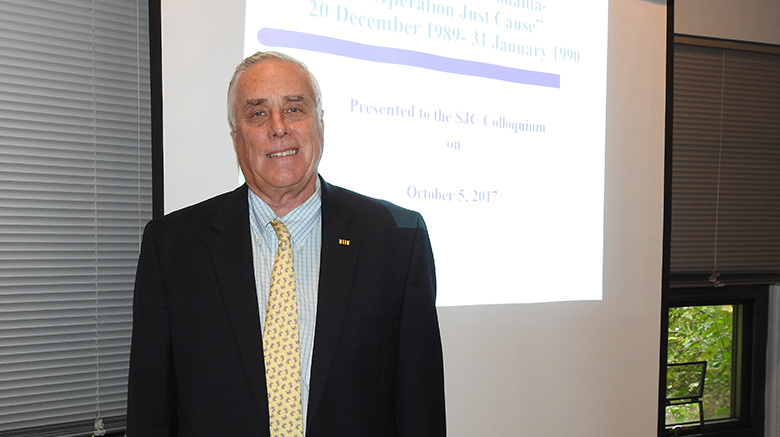What do Manuel Noriega and Kim Jong Un have in common? Declaring war on America, to start.
“Noriega brandished his saber, and he called (George H. W.) Bush out as ‘The Great Satan’,” said Alan Vitters, Ph.D., relating the verbal war between the Panamanian dictator and American president leading up to the 1989 invasion of Panama by the United States, codenamed Operation Just Cause. (“The Great Satan” is perhaps a marginally worse term than “dotard,” a term Kim Jong Un recently used in reference to President Trump.)
While nearly three decades separate the Panamanian conflict from President Trump’s feud with North Korea, Dr. Vitters sees a fearful symmetry.
“Barricades were going up (in Panama) everywhere you looked,” Dr. Vitters said. “There were bomb threats daily. American families were being sent home. The situation was turning grave.”
Well-versed in the art of global war, Dr. Vitters is a retired U.S. Army colonel with 30 years of service in the armed forces. He was awarded two Meritorious Service Medals, seven Air Medals, three Bronze Stars with valor and merit, the Combat Infantry Badge, the Soldier’s Medal, the Vietnam Cross-Country of Gallantry, the Legion of Merit and a Meritorious Unit Commendation.
We don’t get to choose the kinds of wars we fight in. World War II, it was so clear what evil was. These limited wars, starting with Korea onto Vietnam, perhaps today with Afghanistan and Iraq, present all sets of different issues.”
Dr. Vitters now serves as an assistant professor in SJC Long Island’s business administration and marketing department. It was in this capacity that he delivered the liberal arts colloquium “Reflections on the Invasion of Panama: ‘Operation Just Cause’” Oct. 5 at SJC Long Island.
The lecture examined the U.S. invasion of Panama that took place during December 1989 and January 1990. A tactical operation that included Dr. Vitters himself, as part of the Army unit stationed there.
“I’m always interested in the sparks, the miscalculations in military history,” Dr. Vitters said. “The Maine ship in the harbor triggering the Spanish-American war. The Archduke Ferdinand incident.”
This spark, in the case of Operation Just Cause, involved a young U.S. lieutenant stationed in Panama named Robert Paz. One Saturday night, Paz and his friends took a wrong turn and ended up at a Panamanian Defense Forces (PDF) checkpoint. As they attempted to evade the checkpoint, shots were fired. Lt. Paz, who was seated in the backseat, was killed.
According to U.S. military sources, a U.S. Naval officer and his wife witnessed the incident and were detained by PDF soldiers. While in police custody, they were assaulted by the PDF. The U.S. Naval officer spent two weeks in a hospital recovering from the beating. The next day, President Bush ordered the execution of the Panama invasion plan.
“This was the largest, most sophisticated joint contingency operation projected over the longest distance,” Dr. Vitters said. “There were 23 Americans killed in Operation Just Cause, around 500 PDF soldiers were killed. Immediately a new government was stood up. It was not the intent of the U.S. to take over the government. We did want to replace Noriega, and we wanted a popularly elected government to stand up.”
This was the largest, most sophisticated joint contingency operation projected over the longest distance.”
In addition to being stationed in Panama in 1989, Dr. Vitters served as a platoon leader in the 82nd Airborne Division and as a platoon leader and company commander in Vietnam. From 1971 to 1973, he was commander of the Honor Guard in Washington, D.C., directing the casket team for the state funerals of former presidents Harry S. Truman and Lyndon B. Johnson, and FBI Director J. Edgar Hoover.
“We don’t get to choose the kinds of wars we fight in. World War II, it was so clear what evil was. These limited wars, starting with Korea onto Vietnam, perhaps today with Afghanistan and Iraq, present all sets of different issues,” Dr. Vitters said. “Panama was an example of regime change, but I think the lessons are still being learned.”

